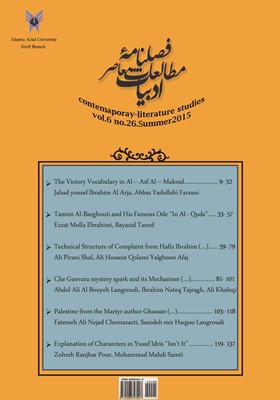Technical Structure of Complaint from Hafiz Ibrahim Point of View
Subject Areas : Contemporary Literature Studies
1 - Associate Professor, Arabic Language & Literature, Kharazmi University
Keywords: الموسیقی, music, Complain, اللغة الشعریة, حافظ إبراهیم, الشکوی, Hafiz Ibrahim, vocabulary,
Abstract :
Emotional complain is derived from the human being inner pains and grief. Hafiz Ibrahim poetry is full of cries and yells because of happiness loss in his life. He has experimented poverty and difficulty and heard the oppressed people complians and shared with them. A strong relationship between his chosen vocabulary and his grief can be seen that the reader would understand the depth of his saddness. His language is simple and has used the simple past tense to express his memories. He also applies the Holy Quran, Haddith and humorous in order to express his sorrow. The complain’s effect also can be seen in his poetry rhyme and rhythm. The words and sentences repeatition helps him to transfer his grief to thev reader and aids to concentrate.
القرآن الکریم.
إبراهیم، حافظ. 2004م، الدیوان، ضبطه وصححه وشرحه أحمد أمین وأحمد الزین وإبراهیم الأبیاری، د.ط، بیروت: دار العودة.
بشر، کمال. 2000م، علم الأصوات، د. ط، القاهرة: دار الغریب.
الجرجانی، عبدالقاهر. 1381ق/ 1961م، دلائل الإعجاز فی علم المعانی، الشیخ محمد عبده ومحمد علی الشنقیطی، القاهرة: شرکة الطباعة العلمیة المعتمدة.
الجندی، علی. 1969م، الشعراء وإنشاد الشعر، د. ط، مصر: دار المعارف.
حسین، طه. لا تا، حافظ وشوقی، د.ط، القاهرة: مکتبة الخانجی.
الدسوقی، عبدالعزیز. 1984م. فی عالم المتنبی، ط1، بیروت: دار الشروق.
ضیف، شوقی. 1990م، تاریخ الأدب العربی عصر الدول والإمارات(مصر)، ط2، القاهرة: دار المعارف.
الطیب، عبدالله. 1989م، المرشد إلى فهم أشعار العرب وصناعتها، ط 3، الکویت: دار الآثار الاسلامیة.
الفاخوری، حنا. 1411ق، الموجز فی الأدب العربی وتاریخه، المجلد الرابع، ط2، بیروت: دار النهضة.
القزوینی، الخطیب. 1424ق، الإیضاح فی علوم البلاغة(المعانی والبیان والبدیع)، ط1، بیروت: دارالکتب العلمیة.
معلوف، لویس. 1388ش، المنجد فی اللغة، ط 35، طهران: انتشارات إسلام.
الهاشمی، احمد. 1383ش، جواهر البلاغة فی المعانی والبیان والبدیع، ط2، طهران: إسماعیلیان.


